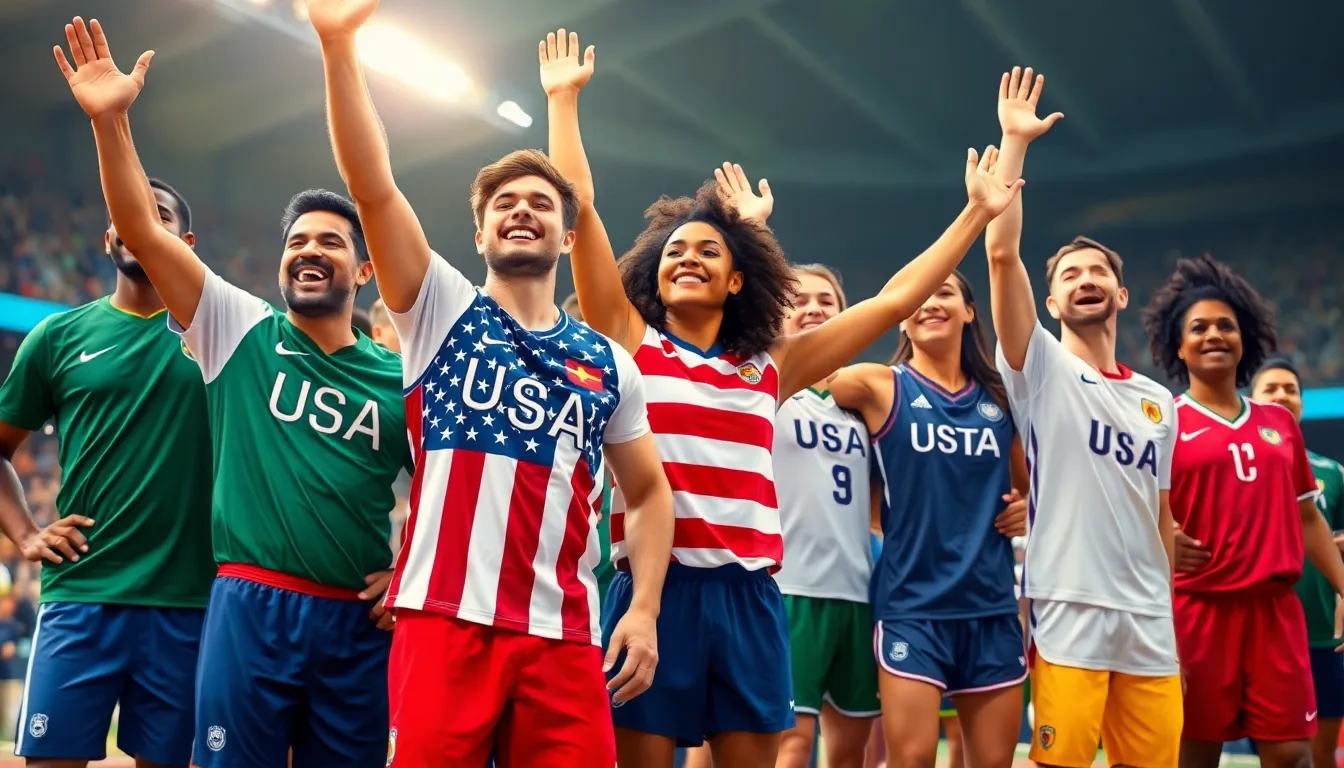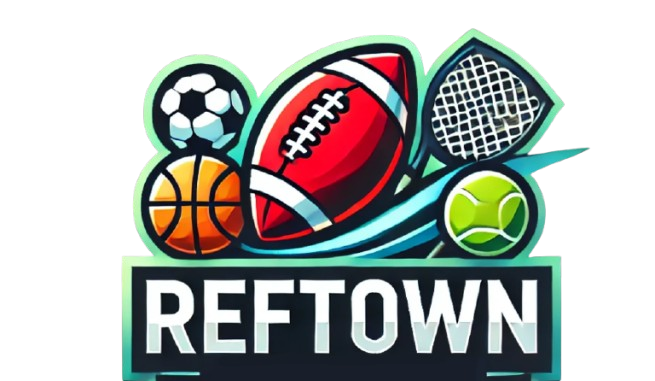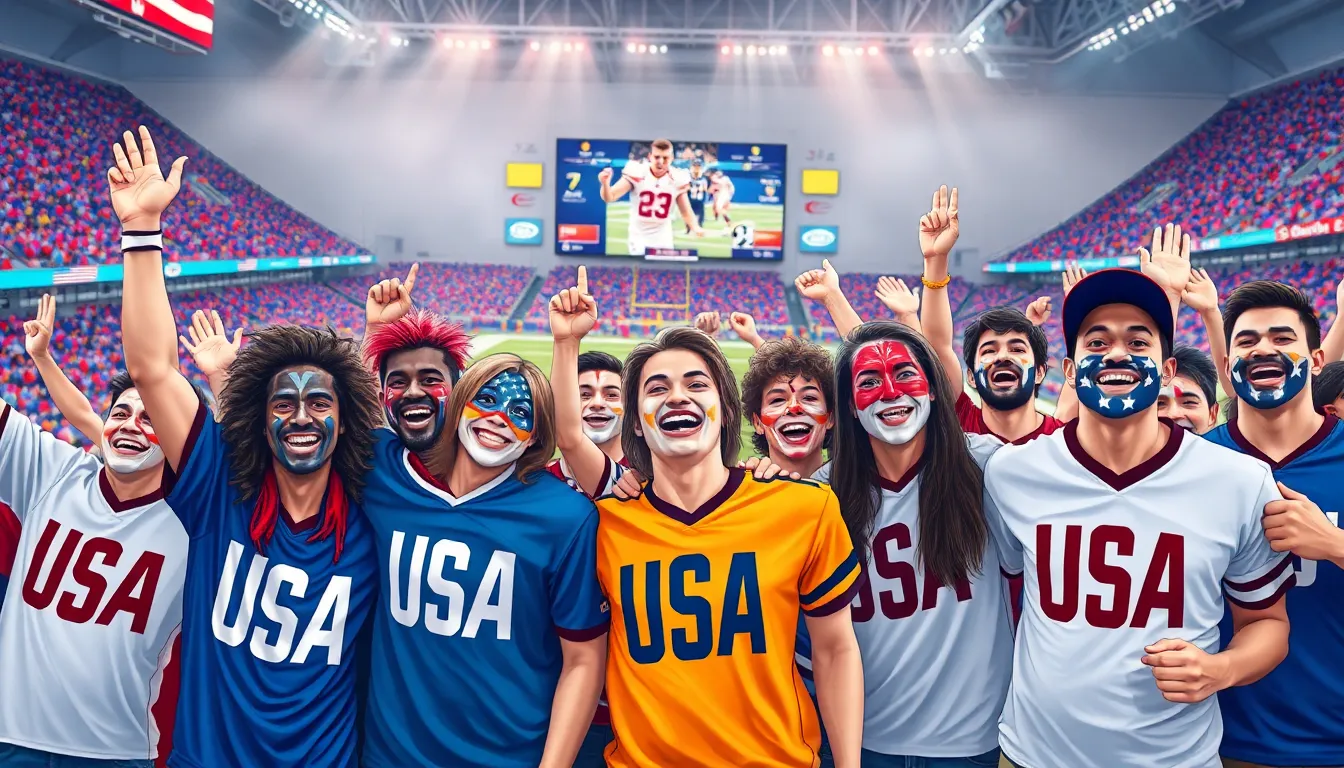From the roar of the crowd to the thrill of victory, sports culture weaves itself into the very fabric of society. It’s not just about the games played on the field; it’s a vibrant tapestry of shared experiences, rivalries, and unforgettable moments that unite fans across the globe. Whether it’s that nail-biting last-minute goal or the epic halftime show, sports culture has a way of making even the most mundane Mondays feel like a championship parade.
Imagine a world where everyone wears their team’s colors proudly, debating stats as if they were life-or-death issues. It’s a place where tailgates become gourmet feasts and every game day feels like a national holiday. Dive into the fascinating realm of sports culture, where passion meets camaraderie, and discover why it’s more than just a pastime—it’s a way of life.
Sports Culture
Sports culture encompasses a set of shared beliefs, values, and practices surrounding sports. This culture creates connections among fans, athletes, and communities, fostering a sense of belonging. Elements like team loyalty, regional pride, and social interactions define sports culture’s landscape.
Community engagement often arises through local teams and events. Many cities host gatherings to cheer for professional teams, creating collective experiences. Additionally, sports culture influences lifestyle choices, from fitness practices to social activities centered around game days.
Distinct rituals emerge within sports culture. Fans perform celebratory dances, while teams adopt unique chants that unify supporters. These rituals enhance the emotional investment fans place in their teams.
Moreover, sports culture extends to language and art. Phrases and slogans gain popularity, reflecting shared experiences among fans. Artists frequently draw inspiration from sports events, merging athleticism and creativity in their work.
Diversity exists within sports culture, with various sports reflecting different community values. While some cultures embrace traditional games, others celebrate emerging sports influenced by globalization. This diversity enriches the overall sports culture, allowing unique expressions of identity.
Lastly, technology plays a significant role in shaping sports culture. Social media platforms connect fans globally, enabling discussions and sharing moments in real time. This connectivity amplifies the collective excitement and experiences associated with sports.
Historical Evolution Of Sports Culture

Sports culture has evolved significantly over centuries, with roots tracing back to ancient civilizations and developments continuing into the modern era.
Ancient Civilizations
Ancient civilizations played a crucial role in shaping sports culture. The Greeks championed the Olympic Games around 776 BCE, emphasizing athletic excellence and competition. This celebration of sports fostered a sense of unity among the city-states. Romans also contributed by introducing gladiatorial contests, blending entertainment with ritualistic elements. Engaging in these activities, societies expressed cultural values such as strength, honor, and community pride. These early sporting events laid the groundwork for future athletic traditions while highlighting the importance of competition in cultural identity.
Modern Era Developments
The modern era transformed sports culture into a global phenomenon. In the 19th century, sports became organized, with leagues and associations forming across various countries. Introducing professional sports further popularized athletes as cultural icons, appealing to mass audiences. Media advancements played a vital role in this expansion, with television broadcasts bringing games into homes. Global events like the FIFA World Cup and the Olympics cultivated international unity while showcasing diverse cultures. Today’s sports culture reflects a blend of tradition and modernity, emphasizing inclusivity, community, and shared passion among fans and athletes alike.
Key Elements Of Sports Culture
Sports culture thrives on principles that unify communities and enhance shared experiences. Three key elements contribute to this dynamic environment: community engagement, fan loyalty, and inclusivity and diversity.
Community Engagement
Community engagement manifests through local teams and events that bring people together. Local sports clubs often serve as the backbone of neighborhoods, fostering strong connections among residents. Events like game days transform into celebrations where families and friends gather to support their teams. Grassroots programs engage youth, encouraging not only athletic development but also social responsibility. These initiatives create a sense of belonging, enriching community life and leaving a lasting impact on participants.
Fan Loyalty
Fan loyalty drives the emotional connection between supporters and their teams. Devoted fans attend games, wearing team colors and sharing traditions that reinforce identity. Loyalty often spans generations, with families passing down support, creating a rich tapestry of shared memories. This unwavering commitment affects game attendance and merchandise sales, essential for a team’s financial stability. Fans actively engage on social media, discussing games and celebrating victories, strengthening community bonds in both physical and digital spaces.
Inclusivity And Diversity
Inclusivity and diversity play significant roles in shaping sports culture. Different sports attract varying demographics, highlighting each community’s unique values. Women and minority athletes increasingly gain visibility, inspiring young fans and promoting representation. Organizations prioritize inclusivity by implementing initiatives that reach underrepresented groups, ensuring that everyone can participate. Awareness and appreciation of diverse traditions and backgrounds foster a richer, more vibrant sports culture that embraces collective strength and unity.
Impact Of Sports Culture On Society
Sports culture significantly influences societal dynamics, fostering a sense of belonging and shared purpose. Fans and athletes unite through common interests, transcending demographics and creating lasting connections.
Social Cohesion
Social cohesion thrives within sports culture, as communities rally around local teams. Their passion fosters relationships among neighbors, encouraging interaction and camaraderie. Events like game nights and watch parties serve as catalysts for connections. Community members often gather to cheer together, reinforcing collective identity. Additionally, shared triumphs and defeats build empathy and understanding among diverse groups. Strong ties develop around traditions, such as unique chants or celebration rituals. These shared experiences cultivate an inclusive atmosphere where individuals from different backgrounds unite. Sports generate common ground, helping bridge divides and strengthen community bonds.
Youth Development
Youth development flourishes through engagement in sports, providing life skills and opportunities for personal growth. Involvement in athletic activities promotes discipline and teamwork, essential attributes for success. Coaches serve as mentors, guiding young athletes both on and off the field. Participation in organized sports fosters resilience and determination, equipping youth with tools to face challenges. Exposure to diverse teammates enhances social skills, preparing young people for future interactions. Through sports, youth discover leadership potential and develop a strong work ethic. As role models, professional athletes inspire the next generation, encouraging aspirations and dreams. Sports also create safe spaces for youth, leading to healthier lifestyles and improved mental well-being.
Global Perspectives On Sports Culture
Sports culture differs around the world, shaped by regional preferences and community values. Every region celebrates its own sports, reflecting unique traditions and social dynamics. For instance, soccer thrives in South America and Europe, where fervent fan bases fill stadiums during matches. Baseball captures the passion of fans in the United States and Japan. In India, cricket dominates the sports landscape, unifying fans across diverse backgrounds. Each region’s sports culture illustrates how local identities influence the way communities engage with athletic activities.
Regional Variations
Regional variations in sports culture emphasize local traditions and community ties. Different sports embody unique values so that fans resonate with athletes representing their regions. North African countries celebrate football fervently, while Australian culture embraces cricket and Aussie rules football. In Asia, martial arts hold significant cultural importance, reflecting discipline and respect. The diversity in sports further enriches global sports culture, revealing how geography and history shape individual experiences.
Popular Sports Worldwide
Popular sports worldwide highlight collective interests and trends among diverse populations. Soccer remains the most popular sport globally, captivating billions through major leagues and international events. Basketball ranks high with its widespread appeal, notably in the U.S. and China. Cricket enjoys immense popularity across Commonwealth nations, while rugby captures the hearts of fans in the UK and New Zealand. Each sport contributes uniquely to global sports culture, fostering connections and shared experiences across various communities.
Conclusion
Sports culture is more than just a pastime; it’s a powerful force that shapes communities and connects people across the globe. The shared experiences and emotions fostered by sports create lasting bonds among fans and athletes alike. As traditions evolve and new practices emerge, the essence of sports culture continues to thrive.
With its emphasis on inclusivity and community engagement, sports culture offers a platform for diverse voices and experiences. This dynamic environment not only enriches local communities but also promotes social cohesion and a sense of belonging. As the world of sports continues to grow and adapt, its cultural impact will undoubtedly remain significant, inspiring future generations to celebrate the spirit of teamwork and unity.

